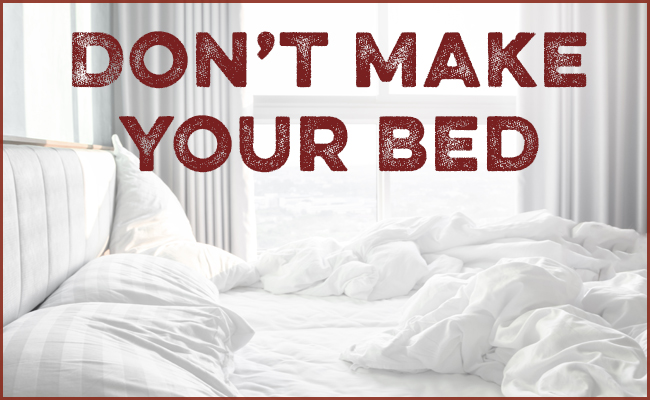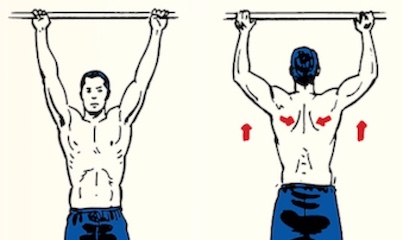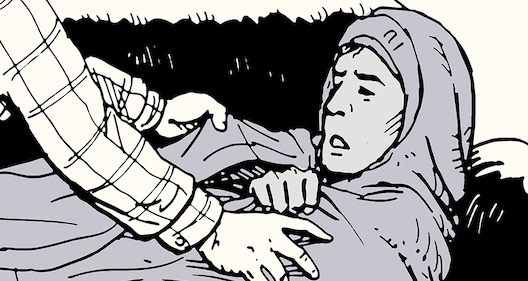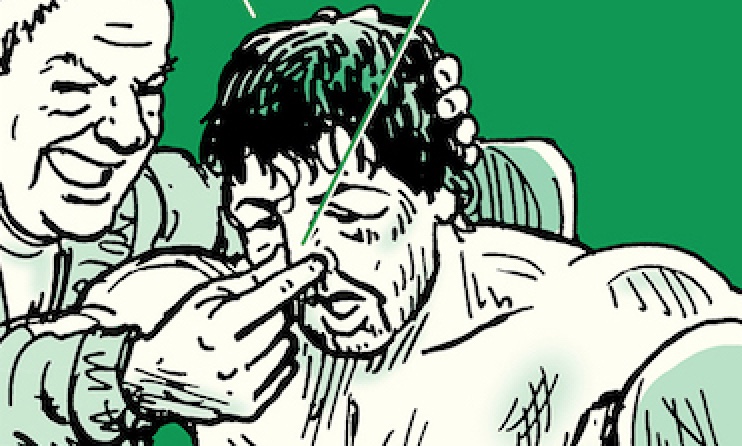
I have a confession to make: I don’t make my bed. I never saw the point in it; I’m just going to mess up the covers again that night. I don’t spend much time in my bedroom, and my guests don’t spend any, so it’s not as if anyone has to keep looking at my bed’s “disheveled” appearance during the day.
I realize that not making your bed has a bit of slovenly shame associated with it. Making your bed seems more organized, more cleanly. In fact, when it comes to daily habits, it even has some cool cache. It’s the kind of foundational habit a four-star naval admiral could base a commencement address, and book, around, and even claim could very well help you change the world. It’s the kind of habit that makes you feel like a stoic soldier — an outward behavior that supposedly reflects the tidiness of an equally disciplined mind.
Given this cool, cleanly cache, I felt surprised (and a little vindicated) when I came across the following passage while recently reading A Bachelor’s Cupboard — a manual for young men on how to live independently published in 1906:
A woman who, as the mother of several sons, has many young men as guests at her large country house, says she can invariably judge a man from the care he takes of his room. A young man who has been well brought up, she says, never fails to turn back his bedclothes [sheets and blankets] upon arising in the morning. If the clothes, sheets and all, are turned back smoothly over the footboard and the pillows placed near the open window in a convenient chair, she decides that the young man’s mother instilled into him that good breeding which makes neatness and cleanliness and care imperative to his comfort and that of his hostess. She further adds a few remarks on the ‘fine husband that man is going to make’ who remembers the little things, but they would be out of place in a bachelor book.
So, the standard for neatness and cleanliness a century back was the opposite of what it is today: rather than pulling his sheets and covers back over his bed up to the headboard, a well-bred gentleman was supposed to drape his bedding over the footboard, leaving both the blankets and the sheet-covered mattress entirely open to the air. Such an airing out was thought to promote freshness and good health (hence why you would also place your pillows by an open window).
One could chalk up this practice to outdated notions of hygiene. But it triggered a memory in me; I thought I remembered that there was modern research done some years ago that backed up this old idea.
I fired off a google search, and indeed, I had remembered correctly.
In 2005, a study was published which found that not making your bed may be better for you than making it.
More than a million dust mites live in your bed. These microscopic critters feed on the flakes of skin you slough off in your sheets, and thrive in warm, moist environments.
When you make your bed in the morning and cover your pillow and mattress with the thick layers of your sweat-infused bedding, you better enable these cozy conditions.
By leaving your bed open to the air and sunlight, you can create a drier, less hospitable environment for the mites. As the lead researcher on the aforementioned study, Dr. Stephen Pretlove, explained to the BBC:
Something as simple as leaving a bed unmade during the day can remove moisture from the sheets and mattress so the mites will dehydrate and eventually die.
Sleeping with dead, dehydrated dust mites may not seem significantly more appealing than lying with moist, live ones, but it’s their fecal matter (yes, dust mites are pooping in your bed) that trigger allergies and asthma. In a week’s time, a single mite can excrete hundreds of allergy-creating fecal particles. Dry up the mites, and you dry up this supply of aggravating allergens, potentially allowing you to breathe better at night.
Of course, to get the full, freshening effect of this, you should drape your bedding over the footboard of your bed, as The Bachelor’s Cupboard instructs, rather than leaving your sheets in a half-on/half-off rumple. Which does take a bit more effort, though not quite as much as making your bed. It’s unclear if this habit will help you change the world, but it will perhaps make it slightly less gross.







